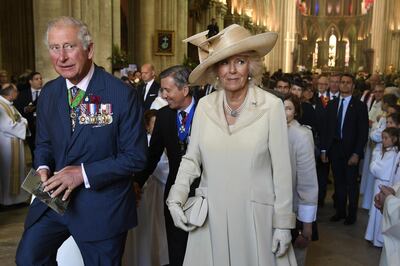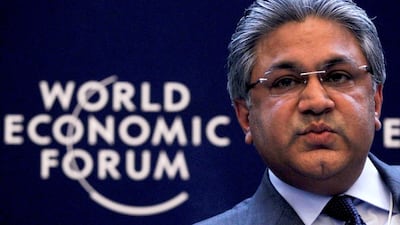One of the Prince of Wales' charities has given more than 1m pounds to the welfare foundation of a businessman facing extradition over the collapse of his private equity empire, it has been disclosed.
The British Asian Trust has, in the past seven years, made grants of 1.4m pounds (Dh 6.52m) to Arif Naqvi's Aman Foundation to run projects easing poverty in Pakistan.
The prominent businessman and philanthropist was arrested on April 10 at London’s Heathrow Airport over charges connected with the collapse of his Dubai-based Abraaj private equity group. Mr Naqvi spent seven weeks in Wandsworth prison before paying $19m (Dh 69.7m) bail on May 29.
American prosecutors allege Mr Naqvi and former Abraaj executive Mustafa Abdel-Wadood, defrauded investors including the Bill and Melinda Gates Foundation. Mr Naqvi and Mr Abdel-Wadood deny wrongdoing and Mr Naqvi has said he expects to be cleared.

The British Asian Trust said it continued to work with the foundation, which is governed by Mr Naqvi and his family and aims to improve healthcare and vocational training for Pakistan's poor. A trust spokesman said Aman was performing strongly to hit the trust's aims. However, it said it was studying the situation and had “contingency arrangements” ready.
“We have been working with the Aman Foundation in Pakistan since 2012 on a number of programmes including mental health and livelihoods. In total we have made grants to the Aman Foundation worth £1.4m,” a trust spokesman said.
The foundation was “wholly independent” from Abraaj and the trust added it had undertaken “an extensive due diligence assessment” before handing over money.
“As expected, we are monitoring the situation and have contingency arrangements that we could enact at short notice, as we do with all our local partner organisations. At this time, no decision has been made to change our working relationship with the foundation.”
The British Asian Trust was founded in 2007 by the prince and leading British Asian entrepreneurs to tackle poverty in South Asia. The charity says it has since helped 4 million people, including recently working with the foundation on a programme to empower Pakistani women. The British Asian Trust is partly funded by the UK's Department for International Development (DFID), which gave a grant of 3.4m pounds (Dh15.8m) in 2017.
Mr Naqvi's wife, Fayeeza, is a trustee of both the British Asian Trust and, alongside her sons and husband, a trustee of the Aman Foundation.
The Aman Foundation was created in 2008 and is most famous for its fleet of 60 ambulances operating in Sindh province. The ambulance service is in the process of being transferred to the provincial government.
A spokesman for the foundation told The National it was an independent and separate organisation from the Abraaj Group.
“As a charitable trust registered in Pakistan, working to transform the lives of people across the country, any matters related to the Abraaj group, or ongoing legal proceedings involving Mr Arif Naqvi, have no bearing on the operations of the Aman Foundation.”
The spokeswoman said the foundation was committed to continuing its work to improve the health and vocational education of poor Pakistanis.
As well as its flagship ambulance service, the Aman Foundation runs a network of female community health workers, a family planning programme to increase the use of contraception and a health telephone helpline for those who cannot get to a clinic.
Separate programmes offer job training to give people a trade. For the past two years, the British Asian Trust, backed by DFID, has been giving grants to the foundation to help women earn a livelihood by teaching them skills and how to get goods to markets.
A DIFD spokesman said: “We have not seen any evidence of wrongdoing at the Aman Foundation and have rigorous checks in place to protect UK taxpayers’ money. We will take firm action if it is misused.
“As with all of our downstream partners we are monitoring the delivery of their UK-funded programmes closely.”

